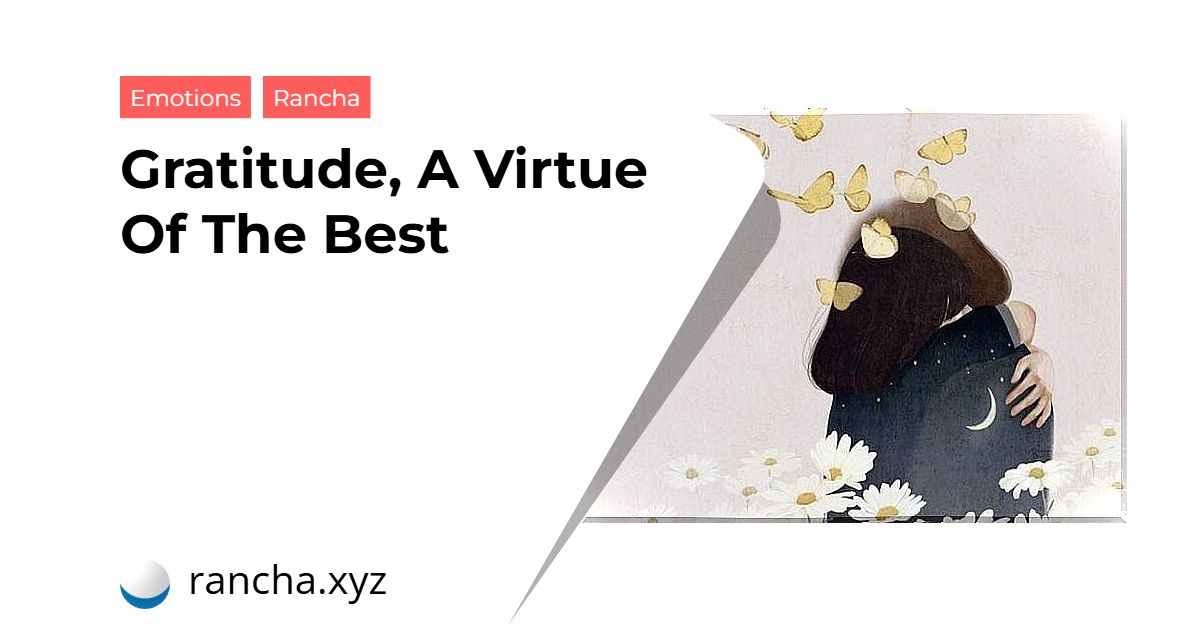The feeling of gratitude does not correspond to one of the basic emotions. It’s just the opposite. Experiencing it requires a series of complex processes in the mind. Not everyone can feel gratitude. This is a virtue reserved for the highest spirits and the most developed intelligences.
Unlike other feelings, gratitude doesn’t just appear as an impulse. Gratitude requires a system of ethical values, in which the concepts of giving and receiving are resolved, in addition to renouncing the egocentric view of life.
The background of gratitude and ingratitude
Gratitude can be defined as a feeling of appreciation for the actions that other people do on our behalf. It implies a kind of moral debt to those who do us good. Debt that does not mean making a calculation to redeem it, but raising the esteem of those who do us a favor or give us a good, and be open to the possibility of repaying the benefit received.

Humans are not the only ones who experience this feeling. Higher animals also have this virtue, although they express it in a rudimentary way. A dog, for example, is loyal to the one who takes care of him and loves him.
People who are unable to feel gratitude have a high level of narcissism. Not only do they have memory problems, they also feel they deserve all the help they get. In fact, many take full credit for the benefits they gain and completely omit what others have contributed to achieving them.
Those who went through difficulties and resolved them know the immense value of helping others. There’s nothing like feeling impeded by something, or trapped, or defeated, to understand that the hand that the other extends is a true gift from heaven.
The Benefits of Gratitude

Gratitude is a subtle and sophisticated feeling. Almost an art. Gratitude springs from the conviction that human beings are incomplete and that we need each other. It is the product of having developed an ethic of cooperation, rather than a competitive or confrontational attitude.
According to a study by Rollin McCraty and Doc Childre, representatives of the HeartMath Research Center and Quantum Intec Inc., respectively, grateful people get great benefits for the good functioning of their heart, tend to get sick less and, in general, are more happy.
The grateful are also people who hardly give space to negative feelings such as regret, resentment and envy. They are able to feel gratitude precisely because they choose to see the best in people and commit it to memory.
They are also more generous. They recognize that helping one another is an important value, which is why they are not only able to appreciate the help they receive, but they are also willing to help others. That’s why not everyone knows how to thank, and this is a virtue that only the best have.
How to practice gratitude
Now that you know some of the benefits of gratitude, here are some activities to put it into practice:
gratitude diary
It consists of taking a few minutes a day to write down, in a notebook or in your diary, 3 positive experiences of the day for which you are grateful. It doesn’t have to be something extraordinary or high-impact. The ideal is to start valuing the little things of everyday life and thanking them for them.
It can be something as simple as saying thank you for a fresh breakfast, a phone call from a great friend, your good health, a hug from a loved one, etc. It is recommended to do it before bedtime, as that way we end the day with a positive touch.
get up thanking
It’s ideal to start the day off on the right foot. To do this, you can start the day by giving thanks for some positive aspect of your life. This will start the day with a different perspective.
Avoid complaints
Complaining is usually not the way out. In problematic situations, the ideal is to focus on the solution. Many people get caught up in bad things, constantly complaining, and therefore live miserable.
Instead, start imprinting gratitude on most of your actions, give thanks before every meal; thank those people who, in one way or another, help you. When you feel overwhelmed by your health, be grateful for the capabilities you still have. Gradually, the habit will be created and you will be able to realize the well-being that these actions provide.
 rancha.xyz Be free to choose their own route to self-knowledge, health and balance of body and soul.
rancha.xyz Be free to choose their own route to self-knowledge, health and balance of body and soul.




